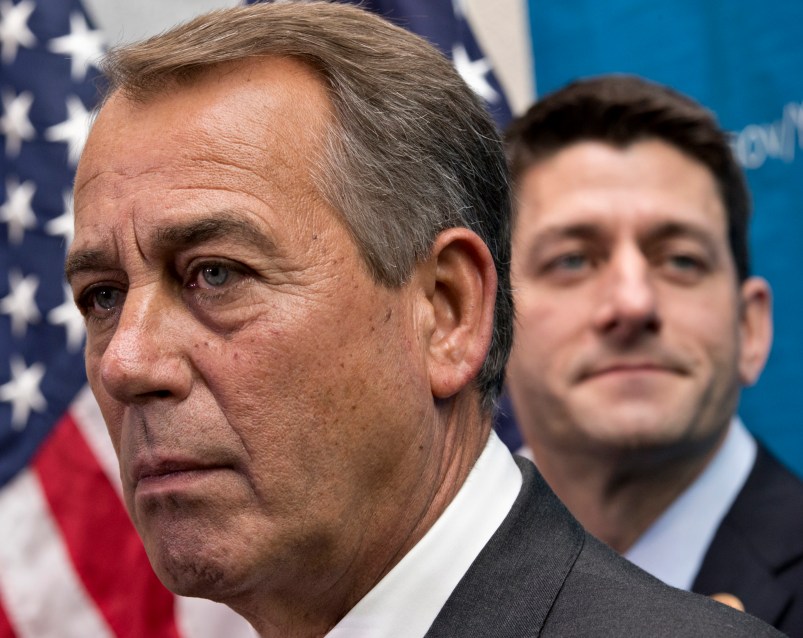WASHINGTON (AP) — Divisions among Republicans over a budget deal and a shortfall in tax estimates are complicating the House GOP’s efforts to advance a spending plan this spring.
Party leaders insist the GOP-controlled House is moving full speed ahead to approve one, but it has fallen behind schedule amid concerns there will be enough votes to pass it.
“That’s our intent,” said House Speaker John Boehner, R-Ohio, when asked this month whether GOP leaders would bring a budget to the floor this year.
Doubts exist because Republicans are split by a bipartisan deal from December between the chairman of the House Budget Committee, Rep. Paul Ryan, R-Wis., and his Senate counterpart Patty Murray, D-Wash. The deal set the spending cap for the 2015 budget year at levels higher than those imposed by a budget and debt agreement from 2011.
Sixty-two House Republicans voted against the Ryan-Murray deal, mostly because they favored lower spending. Most would have to change course and vote in favor of the higher numbers that Ryan has signaled he will use. Democrats who supplied the votes required to pass the December deal probably would not back a Ryan-written budget that reprises future cuts to Medicare, Medicaid and other programs.
The Ryan-Murray cap on spending for the budget year that begins Oct. 1 is $18 billion higher than permitted by the 2011 budget deal and the automatic spending cuts it put in place.
There’s no real need to do a congressional budget if the spending cap is already set. Under Capitol Hill’s arcane budget process, the rest of the budget resolution is mostly nonbinding. But it does provide a vehicle for the majority party to set forth its budget and tax priorities and make promises to voters.
“I’m planning on writing one,” said Ryan, the GOP’s vice presidential nominee in 2012.
Ryan, however, demurred when asked if it will get a vote in the full House.
House Majority leader Eric Cantor, R-Va., announced Friday in an email to Republicans that the House would vote on Ryan’s budget in April and that it would promise to be in balance in 10 years despite starting off with the Ryan-Murray figure for 2015.
Democrats control the Senate, and after passing a budget last year for the first time since 2009, have already said they aren’t writing one this year. That protects vulnerable Democrats from tough votes in a deteriorating political environment for them.
Another problem for Ryan is the latest revenue projections from the Congressional Budget Office, or CBO. They show it will be significantly harder for Republicans to keep their promise of balancing the budget by the end of the decade. The office’s projections of slower economic growth mean lower than previously expected tax revenues. Republicans would have to come up with larger spending cuts than they have in previous budgets.
The CBO now estimates that tax revenues will be about $240 billion lower in 2022, the year Republicans targeted during last year’s debate for bringing the budget into balance. All told, the CBO says its gloomier economic outlook will mean $1.4 trillion in lower revenues over the coming decade than it projected last year.
Aides insist Boehner and other party leaders in the House are determined to get a budget done. Failing to do so would be a big embarrassment and could turn off the core Republican voters they need to boost their numbers in the November election.
“They’re going into uncharted territory if they don’t do a budget. Clearly (that would) protect them from the charge Democrats will make about cutting Social Security and Medicare,” said GOP media consultant Ron Bonjean. “On the other hand, Republicans have become a brand for putting out forward-leaning, fiscally responsible budgets. And when you abandon that, you abandon that brand.”
The fall races look promising for Republicans, especially after a special election in Florida was won by a GOP underdog who criticized the health law and Democratic-passed cuts to Medicare. Taking up Ryan’s budget could give Democrats an opening for health care attacks of their own.
But many Republicans see passing a spending plan as a major opportunity for conservatives frustrated at being checkmated by Obama, and they see it as a way to put Democrats on record in favor of big spending cuts.
“It’s always important to not just hold them to account but to also provide a contrast — and the contrast is the visionary document that outlines what we would do if given the privilege of leading in both the Senate and the House,” said Rep. Tom Price, R-Ga.






